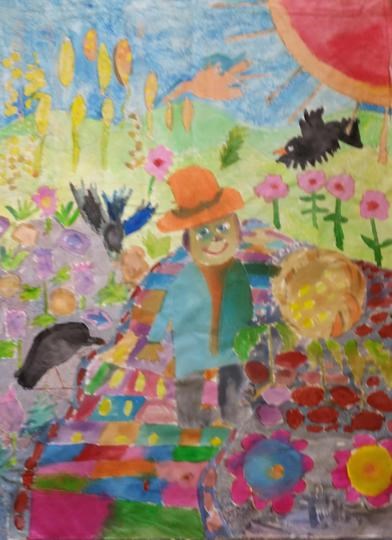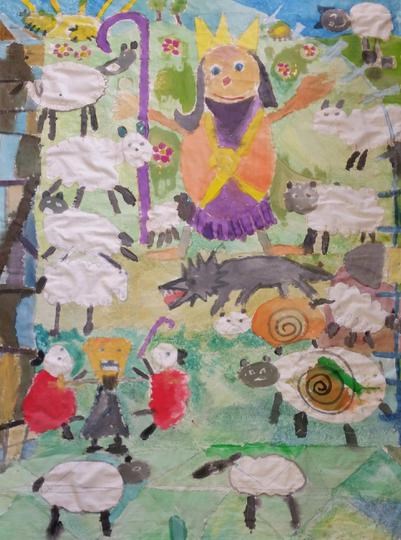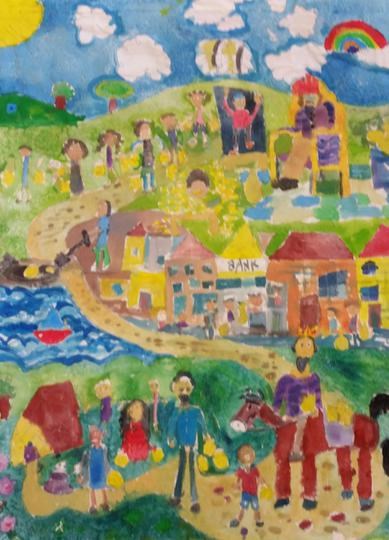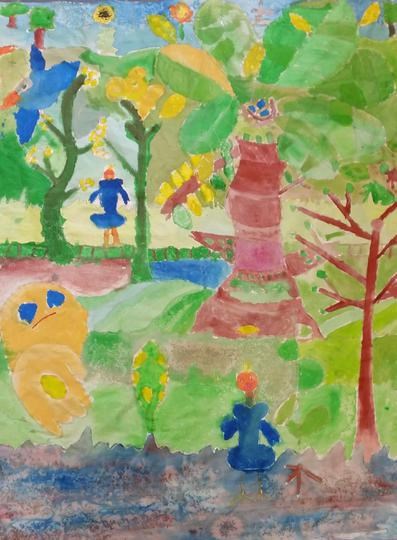Vision and Values
Our school vision:
I came that they may have life and live it abundantly . John 10:10
"Our school is a place where we have the courage to make a difference: where we learn to look after each other and our environment. Our school is a place where we are honest and truthful and where we do good things even when nobody sees. We are friendly and welcoming, inclusive, kind and polite. We do not give up when things are difficult. Our school is a place where we can think and talk about our ideas and discuss big questions, express ourselves, be creative and excited, be safe, supported and challenged."
In this we take as our model the life and teaching of Jesus
Everything we do in our school is underpinned by the values: courage, compassion, resilience and integrity.
Growing in Character, Growing in Learning, Growing in Community
Launton C of E School community shares strong core values. We communicate and celebrate our Christian distinctiveness by exploring a Christian perspective on these values through our choice of specific parables; The Sower, The Talents, The Good Shepherd and The Mustard Seed. We link the parables to the seasons and different stages of the church and school year so that impact of the stories and related values can be more easily understood.
We endeavour to develop and apply these values within the daily life of the school under the following themes: growing character, growing learning and growing together as a community. The Parables connect with the Church year as they reflect the life and teachings of Jesus on the Kingdom of God. Through the creative use of stories and practical links with gardening in different seasons, we aim to help children to gain an understanding of what a relationship with God and their own spirituality can mean to them as an individual and to school community life.
We have a structured programme of assemblies delivered by members of staff and clergy which include these topics: 'Value the Values', God's Big Stories (The parables), 'Growing Character and Talents' and 'Being Extraordinary'- sharing our learning and achievements. In achievement assemblies children are rewarded and recognised for living out the school values. These are also celebrated in 'The Special Events and Christian and British Values Book.'
Parable Garden www.parable-garden.org has effectively partnered with our whole school community and our local parish church to contribute to our school's journey of creative enrichment of our Christian distinctiveness and character education. The initial catalyst for this was through jointly planning and delivering a Parable Garden theme day for the whole school on the theme of parable treasure-hunting. See the following link on the Parable Garden website for more details and photos: http://parable-garden.org/enrich-programme-portfolio/Further work is planned with Parable Garden to help develop aspects of Collective Worship and additional reflective gardens linked to our four parables as part of the enrichment process. The four parables are: The Sower, The Good Shepherd, The Talents, The Mustard Seed.
The Sower - sowing the seeds for growing character, learning and community
A Story About Planting Seed Mark 4: 1-20
Another time Jesus began teaching by the lake. A great crowd gathered around him. So he got into a boat and went out on the lake. All the people stayed on the shore close to the water. 2 Jesus used many stories to teach them. He said, 3 "Listen! A farmer went out to plant his seed. 4 While the farmer was planting, some seed fell by the road. The birds came and ate all that seed. 5 Some seed fell on rocky ground where there wasn't much dirt. The seed grew very fast there because the ground was not deep. 6 But when the sun rose, the plants withered. The plants died because they did not have deep roots. 7 Some other seed fell among thorny weeds. The weeds grew and choked the good plants. So those plants did not make grain. 8 Some other seed fell on good ground. In the good ground, the seed began to grow. It grew and made a crop of grain. Some plants made 30 times more grain, some 60 times more grain, and some 100 times more grain."
9 Then Jesus said, "Let those with ears use them and listen!" Children's International Bible

Used at the beginning of term and at the end of the year to talk about preparing the ground for learning and developing as people and as a community. Linked to seasons in nature and gardening, this parable is a creative accessible tool to help children to consider aspects of their personal journey and the difference that being part of a church school makes to us all.
The Good Shepherd - nurturing ourselves and others
The Shepherd and His Sheep John 10
Jesus said, "I tell you the truth. The man who does not enter the sheepfold by the door, but climbs in some other way, is a thief and a robber. 2 The one who enters by the door is the shepherd of the sheep.3 The man who guards the door opens it for him. And the sheep listen to the voice of the shepherd. He calls his own sheep, using their names, and he leads them out. 4 He brings all of his sheep out. Then he goes ahead of them and leads them. They follow him because they know his voice. 5 But they will never follow a stranger. They will run away from him because they don't know his voice." 6 Jesus told the people this story, but they did not understand what it meant.
Jesus Is the Good Shepherd
7 So Jesus said again, "I tell you the truth. I am the door for the sheep.8 All the people who came before me were thieves and robbers. The sheep did not listen to them. 9 I am the door. The person who enters through me will be saved. He will be able to come in and go out and find pasture. 10 A thief comes to steal and kill and destroy. But I came to give life-life in all its fullness.
11 "I am the good shepherd. The good shepherd gives his life for the sheep. 12 The worker who is paid to keep the sheep is different from the shepherd who owns them. So when the worker sees a wolf coming, he runs away and leaves the sheep alone. Then the wolf attacks the sheep and scatters them. 13 The man runs away because he is only a paid worker. He does not really care for the sheep.
14 "I am the good shepherd. I know my sheep, and my sheep know me,15 just as the Father knows me, and I know the Father. I give my life for the sheep. 16 I have other sheep that are not in this flock here. I must bring them also. They will listen to my voice, and there will be one flock and one shepherd. 17 The Father loves me because I give my life. I give my life so that I can take it back again. 18 No one takes it away from me. I give my own life freely. I have the right to give my life, and I have the right to take it back. This is what my Father commanded me to do." International Children's Bible

The focus from the beginning of the Spring term leading up the Lent is on Jesus as a role model and the link with growing character, through exploring what the fruits of the spirit are and how they help us develop as people. Caring for others is modelled through the quality of relationships between staff and pupils, between pupils across different age groups. It is expected, recognized and celebrated and actively developed through theme days and special events. 'The Young Leader's Programme' is one example of an initiative that promotes cross-phase leadership in nurturing others.
The Talents - using our talents wisely
A Story About Three Servants Matthew 25:14-30
14 "The kingdom of heaven is like a man who was going to another place for a visit. Before he left, he talked with his servants. The man told them to take care of his things while he was gone. 15 He decided how much each servant would be able to care for. He gave one servant five bags of money. He gave another servant two bags of money. And he gave a third servant one bag of money. Then the man left. 16 The servant who got five bags went quickly to invest the money. The five bags of money earned five more. 17 It was the same with the servant who had two bags of money. He invested the money and earned two more. 18 But the servant who got one bag of money went out and dug a hole in the ground. Then he hid his master's money in the hole.
19 "After a long time the master came home. He asked the servants what they did with his money. 20 The servant who got five bags of money brought five more bags to the master. The servant said, 'Master, you trusted me to care for five bags of money. So I used your five bags to earn five more.' 21 The master answered, 'You did well. You are a good servant who can be trusted. You did well with small things. So I will let you care for much greater things. Come and share my happiness with me.'
22 "Then the servant who got two bags of money came to the master. The servant said, 'Master, you gave me two bags of money to care for. So I used your two bags to earn two more.' 23 The master answered, 'You did well. You are a good servant who can be trusted. You did well with small things. So I will let you care for much greater things. Come and share my happiness with me.' International Children's Bible (ICB)

We use the parable of the talents to consider how these values help us focus on working to meet our goals, reaching our potential in using our unique gifts and talents, developing our learning and our character. We explore Pentacost in the church calendar and how the Holy Spirit can be an enabler and encourager as one of the ways to achieve our potential by using our unique gifts and talents for ourselves and others, in order to be the best we can be as individuals and as a community.
The Mustard Seed- celebrating success and achievements
Stories of Mustard Seed and Yeast Matthew 13:31
31 Then Jesus told another story: "The kingdom of heaven is like a mustard seed. A man plants the seed in his field. 32 That seed is the smallest of all seeds. But when it grows, it is one of the largest garden plants. It becomes a tree, big enough for the wild birds to come and make nests in its branches."
International Children's Bible (ICB)

The parable of the mustard seed enables us to reflect on how we have grown during the school year, both as people, as learners and as a community. We celebrate the qualities that we have developed throughout the year as well as other individuals and school achievements. This is celebrating success at the end of the Year. The children plan an assembly to share with the school community in church.
British Values.
The DfE have recently reinforced the need "to create and enforce a clear and rigorous expectation on all schools to promote the fundamental British values of Democracy, the rule of law, individual liberty and mutual respect and tolerance of those with different faiths and beliefs."
At Launton CE Primary School we take our responsibility to prepare children for life in modern Britain very seriously. We ensure that the fundamental British Values are introduced, discussed and lived out through the ethos and the work of the school as well as valuing the diverse ethnic backgrounds of our pupils and families within our community.
Each British value is linked to a key Christian text and the children take part in philosophical enquiries: we have a well-embedded Philosophy for Children program.
| British Value | Key Christian Text |
| Democracy | For God gave us a spirit not of fear but of power and love and self-control. 2 Timothy 1:7 |
| Rule of Law | Whatever is true, whatever is honourable, whatever is just, whatever is pure, whatever is pleasing, whatever is commendable, if there is any excellence and if there is anything worthy of praise, think about these things. Philippians 4:8 |
| Individual Liberty | Just as each one has received a gift, use it to serve one another as good stewards of the varied grace of God. 1 Peter 4:10 |
| Mutual Respect | Treat others just as you want to be treated. Luke 6:31 |
| Tolerance of Different Faiths and Beliefs | Treat others just as you want to be treated. Luke 6:31 |
Children embrace these concepts with enthusiasm and demonstrate a good understanding of their application to their own lives. The school makes considerable efforts to ensure children have exposure to a wide range of experiences beyond their local community during which these concepts are shown, through for example sporting events, a range of visits, and use of outdoor education centres. Their strong-rooted, Christian, values-based understanding gives them an excellent platform for embracing difference.
Democracy
The children at Launton CE Primary School see democracy borne out in a variety of ways and recognise this as being an essential component of successful team working.
Democracy is embedded at our school. Pupils are always listened to by adults and are taught to listen carefully and respect the right of every individual to have their opinions and voices heard.
- Adults listen to the views of the pupils and value their opinions.
- Each year the pupils decide upon their class rules and the responsibilities associated with these. All the pupils contribute to drawing up the rules.
- We have an elected school council that meets at least 3 times a term and includes two children from each year group.
- Democracy is promoted through the curriculum e.g. in debates and some topic work.
- Children are regularly asked their views, including through an annual questionnaire. The results are fed back, shared with staff and governors and then decisions may be based on it.
- Children are able to work cooperatively in pairs, groups across the year groups as well as in whole class/school situations. They understand about turn taking and respecting the views of others.
The rule of law
The children at Launton CE Primary School are familiar with the concept through the philosophy that infuses the entire work of the school.
The importance of rules, or laws, is constantly reinforced during lessons, break times, lunchtimes and worship. Rules include class rules, school rules and rules that govern the country.
- The whole school community decided our school rules
- Each class discusses the school rules and, ensuring they are clearly understood by all and are necessary to make certain that every class member is able to learn in a happy, safe and ordered environment.
- Our high standards of behaviour across the school are promoted by positive praise and consistency by all staff.
- Children are familiar with the concept through the discussion of values and in RE lessons the idea that different religions have guiding principles.
- Children are taught the reasons behind rules, the importance of observing rules and the consequences when rules are not adhered to.
- Our Christian values enable children to find examples of why we follow a code of conduct and to recognise and appreciate when others demonstrate positive behaviour.
- Children are able to articulate how we need to behave in school and why, and demonstrate they understand and can abide by these conventions.
Individual liberty
The children in Launton CE Primary School are actively encouraged to make choices, knowing that they are in a safe and supportive environment.
Our teaching and learning philosophy places emphasis on the right to have our own thoughts and evidence based views.
- Through our school values and aims, as well as through teaching across the curriculum children are taught about personal responsibility, the courage to stand up for what is right, resilience and aspiration.
- Children are encouraged to know, understand and exercise their rights and personal freedom and are advised how to exercise these safely.
- In daily lessons, children are encouraged to develop independence in learning, to think for themselves and are provided with a choice in the level of challenge through differentiated success criteria.
- Children support charities through raising money, sharing products (Bicester Foodbank) and giving to those in need.
- Children are encouraged to discuss and debate, expressing their opinions and respecting the rights of others to hold differing points of view.
Mutual respect
Respect is a fundamental school value at Launton CE Primary School.
Respect is discussed extensively, starting with self-respect and covering respect for family, friends and other groups, the world and its people and the environment.
- Our school ethos and behaviour policy are based around core Christian values such as 'respect' and these values determine how we live as a community at Launton CE Primary School.
- We provide as many opportunities as possible for the children to work together across classes, key stages and across the school.
- We have high expectations of behaviour and a consistent approach by staff ensures mutual respect.
- Children are encouraged to celebrate diversity and to see everybody in the school as unique.
- Staff and governors are good role models treating each other as equals.
- The children know and understand what is expected and that it is imperative that respect is shown to everyone, whatever differences we may have and to everything, however big or small.
Tolerance of different faiths and beliefs
This is achieved at Launton CE Primary School through enhancing pupils' understanding of their place in a culturally diverse society and by giving them opportunities to experience such diversity.
- Our school enhances pupils understanding of different faiths and beliefs through RE and discussing key festivals (Chinese New Year).
- Regular assemblies and discussions on the themes of prejudices and prejudice based bullying have been followed and supported by learning in RE.
- Tolerance of different faiths and beliefs is promoted through the Locally Agreed Syllabus for Religious Education with children learning about different religions, their own beliefs, places of worship and festivals.
- Members of different faiths and religions are encouraged to share and celebrate their knowledge within class and school.
- Geographical studies ensure children learn about other cultures e.g. music, dance, design, living and faiths.
- We use opportunities such as the Olympics and World Cup to study and learn about life and culture in other countries.
- As part of our worship, children explore how a particular value is important in a range of faiths and act out traditional faith stories that demonstrate this.
- We actively support charities, both in Britain and overseas, developing the children's appreciation and respect for the differences and inequalities in the world and of all the things that we share as human being, for example the need for food, shelter, security and love.



